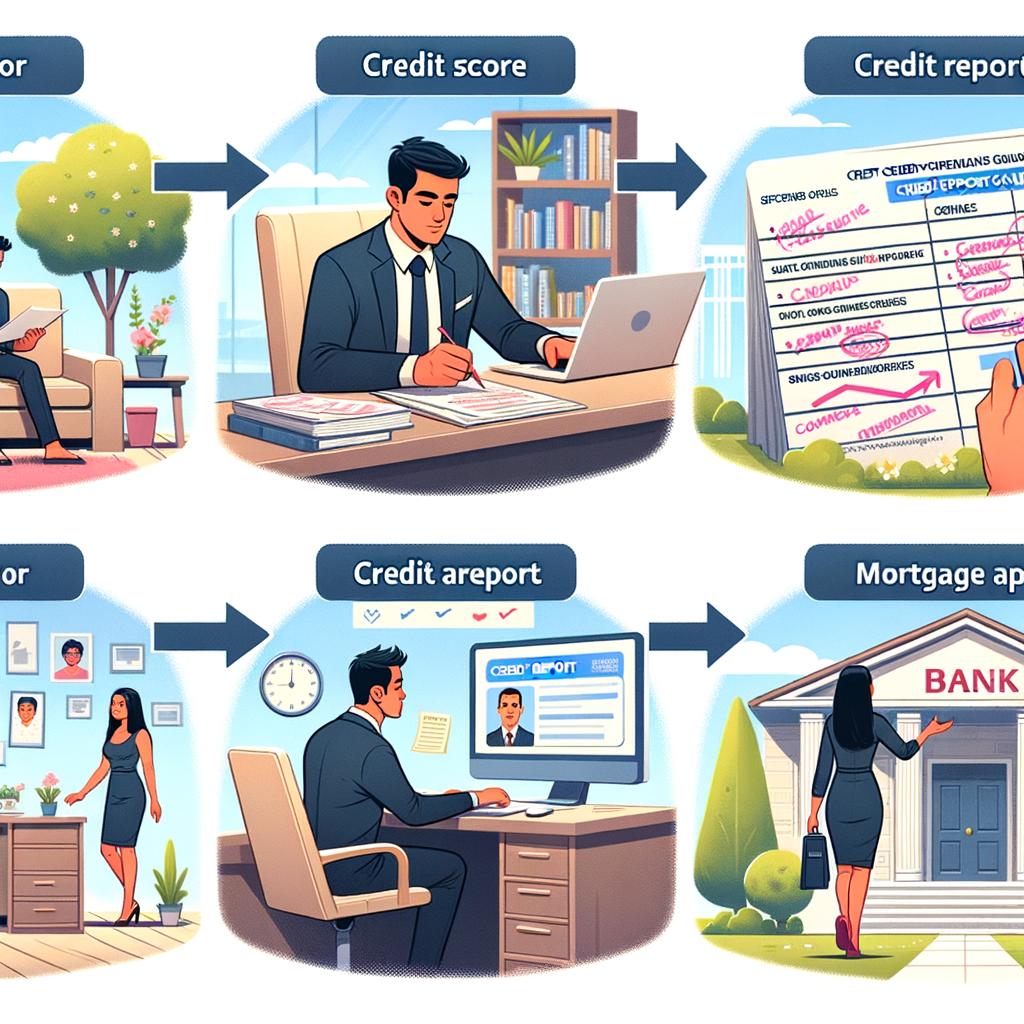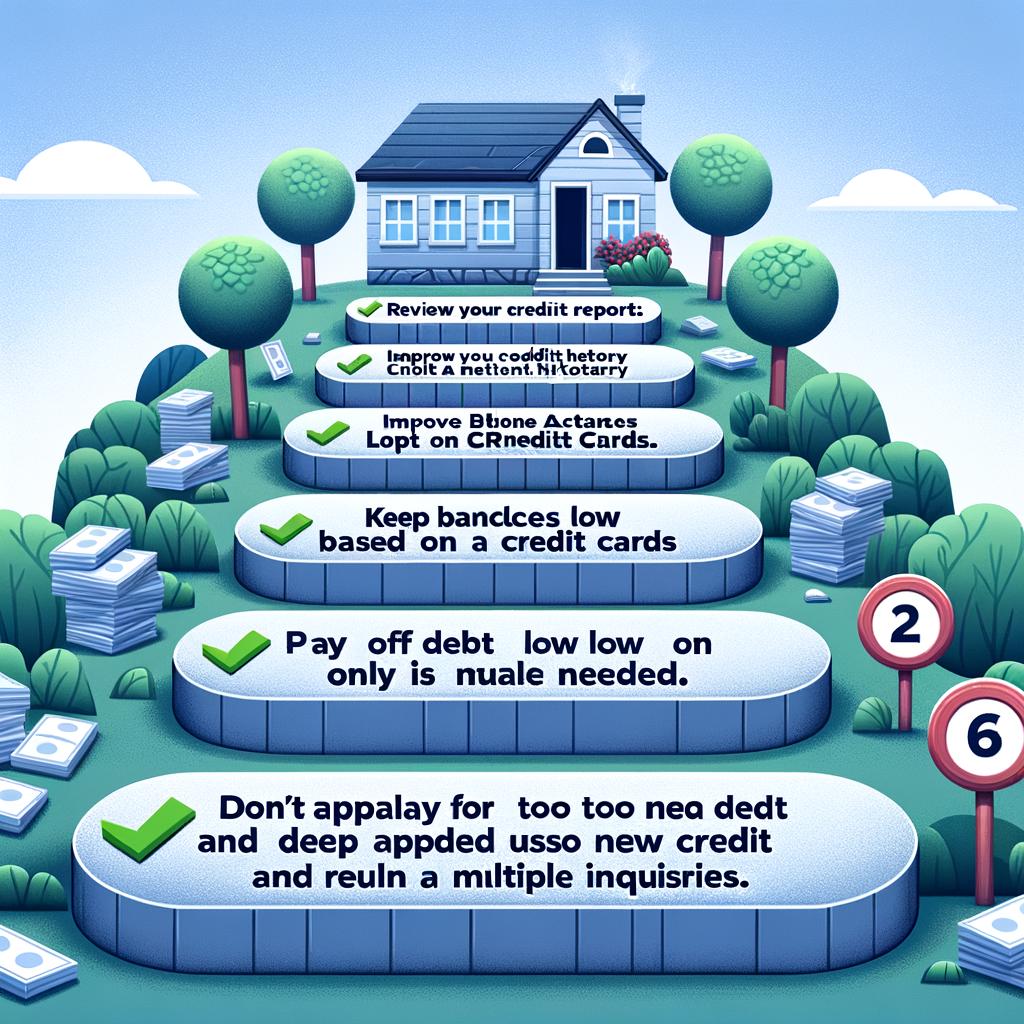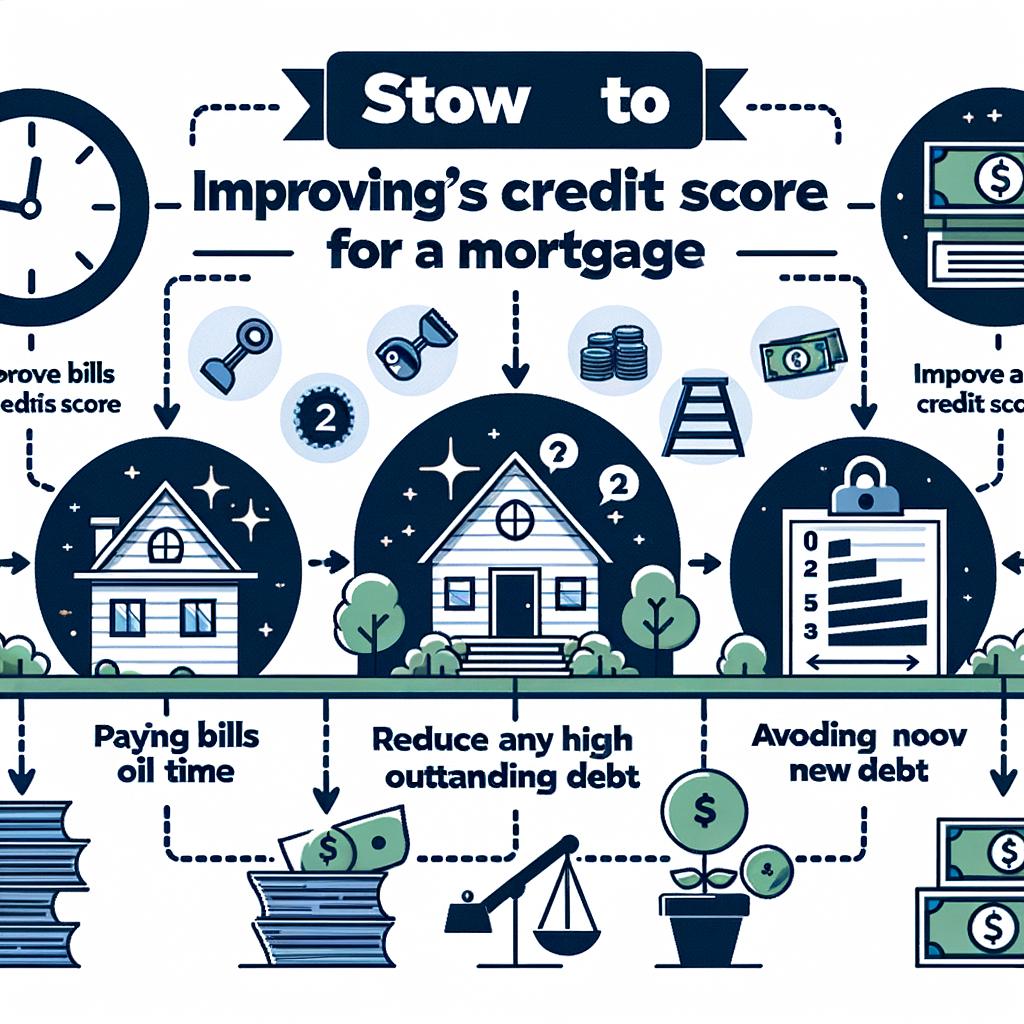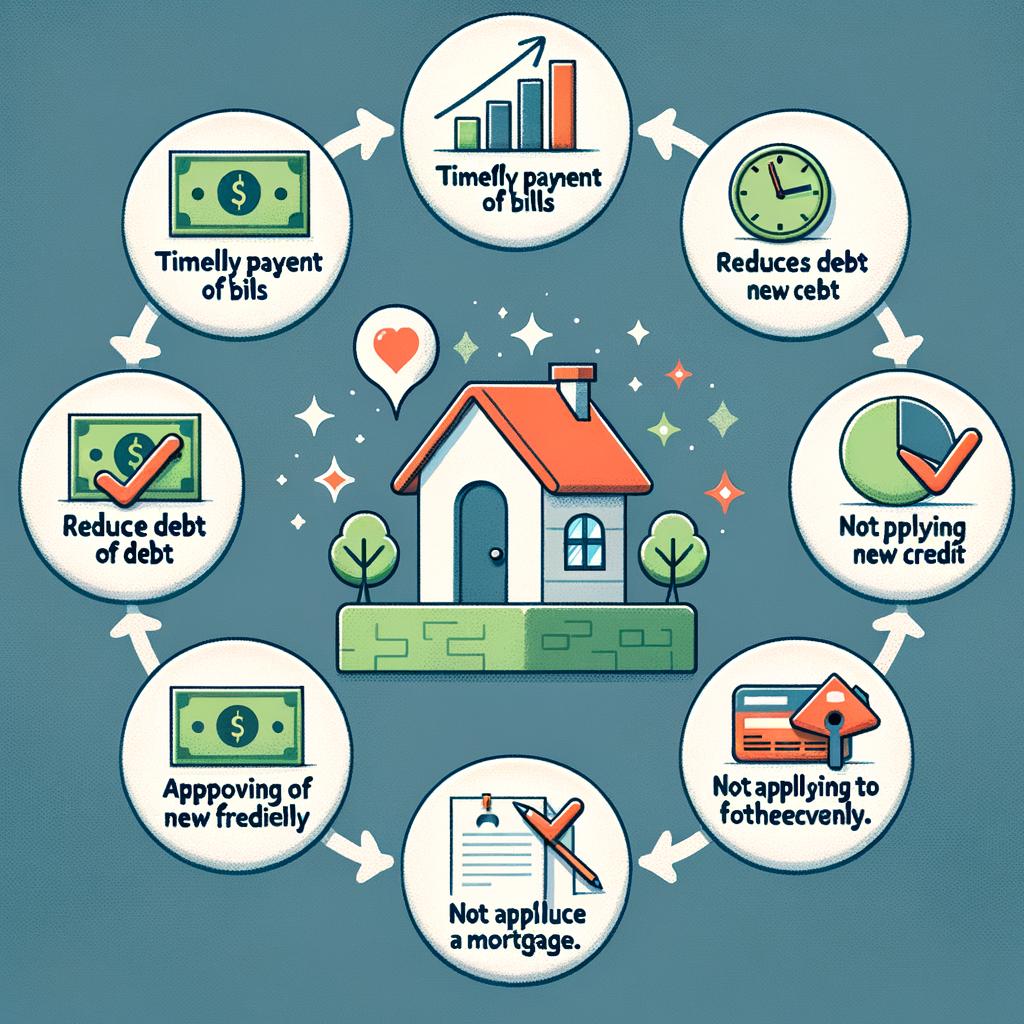Picture this: Your dream home, with the perfect garden, cozy rooms, and that sense of belonging you’ve always yearned for, is just a signature away. But there’s one invisible barrier standing between you and the keys to your future sanctuary: your credit score. This seemingly innocuous three-digit number can either pave your path to homeownership or obstruct it. In the world of mortgages, it’s the quiet gatekeeper, influencing how lenders perceive your financial health and, ultimately, the options available to you. Navigating this terrain might seem daunting, but fear not. In this article, we’ll uncover the nuanced strategies to elevate your credit score, ensuring that when the moment arrives, you’re well-prepared to secure the mortgage you need to turn your house-hunting dreams into reality.
Table of Contents
- Understanding Credit Scores: The Key to Unlocking Your Mortgage
- Effective Strategies to Tackle Outstanding Debts
- Smart Credit Utilization: Balancing Borrowing and Limits
- The Power of Timely Payments: Building a Trustworthy Profile
- Q&A
- Concluding Remarks

Understanding Credit Scores: The Key to Unlocking Your Mortgage
Credit scores play a critical role in the mortgage approval process. Without a good understanding of how these scores are calculated and what can impact them, you may find yourself at a disadvantage when it comes to securing favorable loan terms. Let’s dive into the essentials that can significantly influence your score and help you unlock the door to your new home.
Your credit score is typically influenced by several key factors:
- Payment History: Timely payments are crucial as they make up the largest part of your score.
- Credit Utilization: How much of your available credit you’re using can significantly impact your score.
- Credit History Length: The age of your oldest account and the average age of all your accounts are factors.
- New Credit: Recent credit inquiries and newly opened accounts can temporarily drop your score.
- Credit Mix: A variety of credit types (e.g., credit cards, installment loans) can be beneficial.
Given the above factors, it’s essential to regularly review your credit report. Checking for errors and disputing inaccuracies can prevent unnecessary dips in your score. Make sure you access your free annual credit reports from the three major bureaus—Equifax, Experian, and TransUnion.
Even small changes can make a big difference. For instance, reducing your credit card balances to below 30% of your credit limit can significantly boost your score. This is known as improving your credit utilization ratio. The table below illustrates how different utilization rates can impact scores:
| Utilization Rate | Impact on Score |
|---|---|
| 0-10% | Very Positive |
| 10-30% | Positive |
| 30-50% | Neutral |
| 50-75% | Negative |
| 75-100% | Very Negative |
Opening new lines of credit isn’t always beneficial. Each inquiry can shave points off your score, especially if they occur too frequently. Instead, focus on maintaining long-standing accounts and only apply for new credit when it’s absolutely necessary.
If you’re struggling with a low score, consider engaging with a credit counseling service. These professionals can guide you through debt management plans, negotiate with creditors, and provide personalized advice on improving your financial health.
Additionally, a strategic way to boost your score is to become an authorized user on a family member’s or friend’s credit card account. Be sure that the primary cardholder has a good payment history and low balances, as this can positively reflect on your score.
Lastly, remember that improving your credit score is a marathon, not a sprint. Patience and consistency in good credit practices will pay off over time, leading you to better mortgage terms and closer to owning your dream home.

Effective Strategies to Tackle Outstanding Debts
Dealing with outstanding debts can be daunting, but with a systematic approach, you can efficiently manage and eventually eliminate them. Here are some strategies to help you get started:
- Create a Comprehensive List
Begin by listing all your debts, including the creditor’s name, balance, interest rate, and due dates. This will give you a clear picture of your financial obligations and help you prioritize your payments. - Prioritize High-Interest Debts
Focus on paying off debts with the highest interest rates first. This strategy, known as the avalanche method, can save you money on interest and reduce your overall debt faster. - Consider Debt Consolidation
Combining multiple debts into a single loan can simplify your payments and potentially reduce your interest rate. Debt consolidation can be done through a personal loan, balance transfer credit cards, or a home equity loan.
Effective management and repayment plans are crucial. Implementing a budget can significantly aid in managing your finances:
| Step | Description |
|---|---|
| 1. Track Expenses | Record all your monthly expenses to identify areas where you can cut back. |
| 2. Set Financial Goals | Establish short-term and long-term goals to stay motivated and focused on your debt repayment journey. |
| 3. Allocate Funds | Divert extra funds from discretionary spending towards debt repayment. |
Another effective tactic is negotiating with creditors. Many creditors are willing to work with borrowers to create modified payment plans or reduced interest rates. This not only helps in relieving financial pressure but also demonstrates a proactive approach to debt management.
- Seek Professional Advice
Consulting a financial advisor or credit counselor can provide you with tailored advice and strategies to manage your specific debt situation. They can also help you navigate options like debt settlement or bankruptcy if necessary. - Automate Payments
Setting up automatic payments ensures that you never miss a due date, which is crucial for maintaining a good credit score.
Maintaining open communication with your creditors is vital. Inform them immediately if you’re facing financial difficulties. Being transparent about your situation can lead to more favorable terms and prevent your account from going into collections.
If possible, increase your income to expedite debt repayment. Whether it’s taking on a part-time job, freelancing, or monetizing a hobby, the extra cash flow can significantly accelerate your debt payoff timeline.
avoid accumulating new debts while repaying your existing ones. This means limiting the use of credit cards and refraining from taking out additional loans unless absolutely necessary. Adopting a cash-based spending system can help reinforce this discipline.

Smart Credit Utilization: Balancing Borrowing and Limits
One of the key factors to master on your journey to a stellar credit score is understanding how to manage your credit efficiently. Proper utilization of your credit can significantly impact your score and, consequently, your ability to secure a favorable mortgage. Here’s how smart credit usage can steer you towards mortgage approval success.
Understand Your Credit Utilization Rate: This is the ratio of your current credit card balances to your credit limits. For example, if you have a total credit limit of $10,000 and your combined balance is $3,000, your utilization rate is 30%. To improve your credit score, aim to keep this rate below 30%, and ideally around 10%. High utilization signals high risk to lenders, even if you always pay on time.
Pay Balances in Full Monthly: Carrying a balance month over month, even if it’s manageable, can negatively impact your credit score. By paying off your balances in full each month, you not only avoid interest charges but also keep your utilization rate low. When calculating how much to pay, consider dividing your total credit limit by your actual expenditures to ensure you only spend what you can pay off.
| Credit Card | Credit Limit | Current Balance |
|---|---|---|
| Visa | $5,000 | $1,000 |
| MasterCard | $3,000 | $500 |
| Discover | $2,000 | $700 |
Opt for Higher Credit Limits Wisely: Requesting a credit limit increase is a quick way to alter your credit utilization ratio favorably without additional spending. If you have a good credit history, your lender might approve this request. However, refrain from maxing out any cards, as this can backfire and damage your score.
Strategize Your Payments: Making payments more than once a month can further benefit your credit score. This habit helps keep your balances consistently low, potentially reflecting positively when your issuer reports to the credit bureaus. Set up reminders or automatic payments to manage this efficiently.
Diversify Your Debt: Credit scoring models consider the different types of credit accounts you have. Having a mix, such as credit cards, an auto loan, and a personal loan, can be beneficial. However, avoid opening new accounts solely to diversify, as hard inquiries and the newness of accounts can initially lower your score.
- Advantages of Low Utilization Rates:
- Improved creditworthiness perception
- Lower interest costs
- Increased likelihood of loan approval
Monitor Your Credit Report: Regularly checking your credit report ensures that you can quickly identify and rectify errors. Inaccuracies can unfairly impact your score. Federal law allows you to request a free copy of your credit report from each of the three major credit bureaus once every 12 months at annualcreditreport.com.
By adopting these strategies, you can make significant strides in improving your credit score. Balancing your credit means carefully managing how much you borrow compared to your available credit limits. Stay proactive and strategic, and you’ll be well on your way to securing a favorable mortgage deal.

The Power of Timely Payments: Building a Trustworthy Profile
When seeking to improve your credit score for a mortgage, nothing spells reliability more than consistently making timely payments. This simple yet powerful action directly impacts your credit health and influences lenders’ perceptions of your trustworthiness.
First, let’s understand why timeliness is pivotal. Payment history constitutes a significant portion of your credit score, typically around 35% of the total calculation. Every payment made on time adds a positive mark to your profile, enhancing your credibility.
Consider the following:
- Credit Cards: Always pay at least the minimum amount due, if not the full balance.
- Loans: Ensure every installment is paid by its due date.
- Utilities and Rent: Although not directly related to your credit score, timely payments can still reflect positively if reported.
But don’t let perfection be the enemy of good. Life happens, and missing a payment occasionally isn’t the end of the world. The key is to not make it a habit. Habitual late payments can sully your credit report and lead to a domino effect of increasing debt and higher interest rates.
Ahead of each due date, setting reminders can be a lifesaver. Use your calendar app, or even better, automate your payments through your bank. Automated payments ensure you never miss a deadline, maintaining a clean record.
Example Payment Reminder Tools:
| Tool | Type | Key Feature |
|---|---|---|
| Google Calendar | App | Recurring reminders |
| Mint | App | Bill tracking |
| Banking Apps | Various | Automated payments |
Besides reminders, understanding your payment cycles is crucial. If your paycheck schedule doesn’t align with your payment due dates, negotiate with your creditors for a more manageable timeline. Many institutions are willing to adjust due dates to better suit their customers’ payment capabilities.
Lastly, keep an eye on your credit report. Regularly review it for inaccuracies and disputes them promptly. Acknowledging and correcting errors ensures your score accurately reflects your financial behavior, thereby bolstering your profile for that coveted mortgage.
Q&A
Q: What is a credit score and why is it important for getting a mortgage?
A: A credit score is a numerical representation of your creditworthiness, typically ranging from 300 to 850. It is calculated based on your credit history, including your payment history, the amount owed, the length of your credit history, new credit, and the types of credit used. Lenders use your credit score to assess the risk of lending you money. A higher score can increase your chances of getting approved for a mortgage and securing a more favorable interest rate.
Q: What are the primary factors that influence my credit score?
A: Your credit score is influenced by five key factors:
- Payment History (35%): Timely payments on credit cards, loans, and other forms of credit.
- Amounts Owed (30%): The total amount of debt you owe, and your credit utilization ratio.
- Length of Credit History (15%): How long your credit accounts have been open.
- Credit Mix (10%): The variety of credit types you have, such as credit cards, mortgages, and loans.
- New Credit (10%): Recent applications for new credit and new credit accounts.
Q: What steps can I take to improve my credit score before applying for a mortgage?
A: There are several strategic steps you can take to boost your credit score:
- Pay Bills on Time: Consistently making on-time payments is crucial.
- Reduce Debt: Aim to lower your overall debt and credit card balances.
- Monitor Your Credit Report: Regularly check your credit report for errors and dispute any inaccuracies.
- Limit New Credit Inquiries: Avoid opening new credit accounts or making multiple credit inquiries.
- Keep Old Accounts Open: Maintain older credit accounts to benefit from a longer credit history.
- Diversify Credit Types: Manage a mix of credit types responsibly.
Q: How can I check my credit report and score?
A: You can obtain a free copy of your credit report from each of the three major credit bureaus—Equifax, Experian, and TransUnion—once a year through AnnualCreditReport.com. Many financial institutions also offer free credit score monitoring services to their customers, which can provide you with regular updates on your score.
Q: How long does it typically take to see improvements in my credit score?
A: The time it takes to see improvements in your credit score can vary depending on your individual situation and the specific steps you take. Positive changes can start appearing within a few months, but significant improvements may take six months to a year of consistent, responsible credit management.
Q: What should I avoid doing if I’m trying to improve my credit score for a mortgage?
A: To prevent any setbacks in your credit score improvement efforts, avoid these common pitfalls:
- Missing or making late payments.
- Running up high balances on credit cards.
- Closing old credit accounts, which can shorten your credit history.
- Applying for multiple new credit accounts in a short period.
- Ignoring errors on your credit report.
By following these guidelines and managing your credit wisely, you’ll be better positioned to secure the mortgage you need with favorable terms.
Concluding Remarks
As we conclude this journey through the intricacies of improving your credit score for a mortgage, it’s clear that the steps you take today can lay the foundation for the home of your dreams tomorrow. By understanding the mechanics of credit, diligently monitoring your financial habits, and making strategic moves, you can transform your credit profile into a solid springboard for mortgage approval. Remember, the path to financial health isn’t a sprint but a marathon—one that rewards persistence, patience, and informed choices. So, take a deep breath, embrace the process, and inch ever closer to unlocking the front door of your new home. Here’s to a future where your credit score isn’t just a number, but a stepping stone to achieving your dreams!
